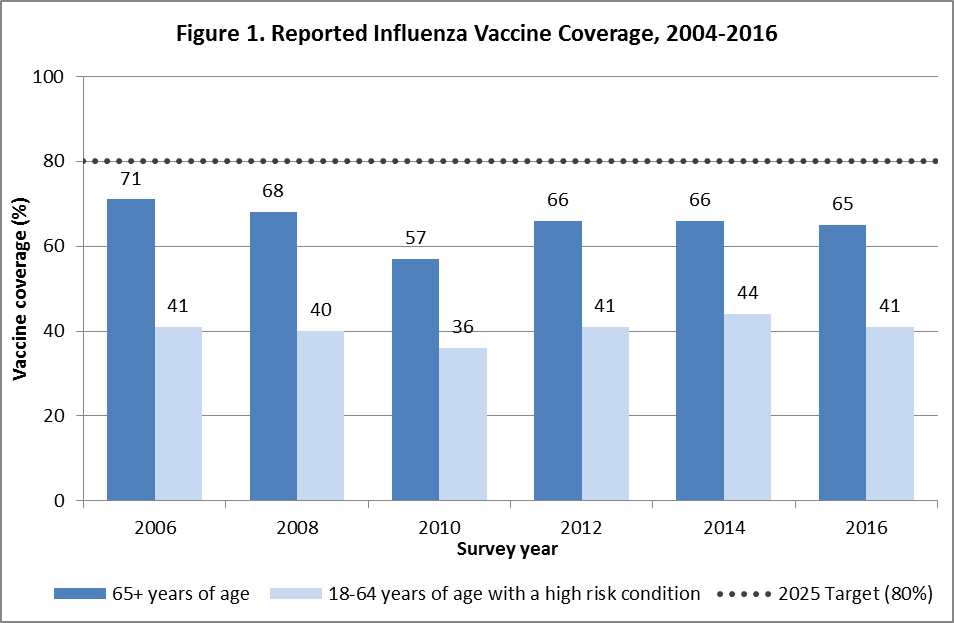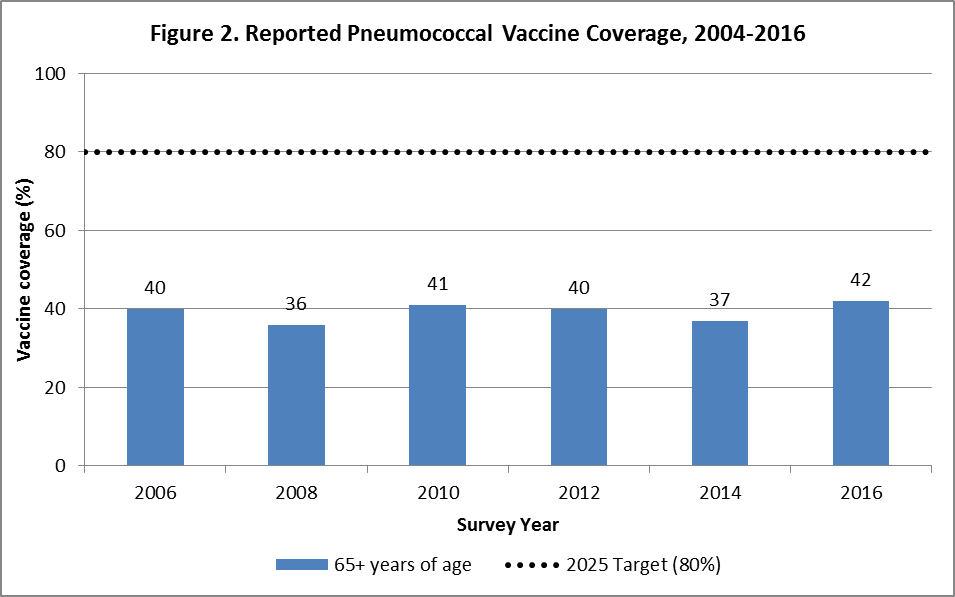Vaccine uptake in Canadian adults: Highlights from the 2016 adult National Immunization Coverage Survey (aNICS)
What is the adult National Immunization Coverage Survey (aNICS)?
aNICS is a survey conducted by the Environics Research Group on behalf of the Public Health Agency of Canada. It measures the percentage of Canadian adults that have received the recommended vaccines for adults.
Why conduct this survey?
Results from national immunization coverage surveys provide information about how well Canadians are protected against vaccine preventable diseases as well as what they know and think about vaccines.
Survey results are used to:
- Measure progress towards achieving Canada's national vaccination coverage goals.
- Assess how well vaccination programs are working, and how they could be improved.
- Report Canada's vaccination coverage to the World Health Organization (WHO).
Key Results:
What did the 2016 aNICS results tell us regarding the percentage of Canadians vaccinated against tetanus and pertussis?
- 54% of adults reported having been vaccinated against tetanus within the last 10 years.
- Among individuals who have been treated for a wound in the last decade (n=946), 82% reported having received a tetanus vaccine.
- Only 10% of adults reported having received a booster dose of the pertussis vaccine after 18 years of age.
It is important for adults to keep their tetanus immunization up-to-date. They should have a booster shot every 10 years for continuing protection.
All adults should receive one booster dose for pertussis vaccine (Tdap vaccine) if they were not previously immunized in adulthood. It is particularly important for adults having regular contact with an infant to be immunized and to receive a dose of Tdap vaccine at least two weeks before being in contact with a baby.
Did Canada meet its national vaccination coverage goals?
National vaccination coverage goals to be achieved by 2025 apply to adult vaccines as follows:
- Achieve 80% vaccination coverage (one dose) of a pneumococcal vaccine among adults 65 years of age and older.
- Achieve 80% vaccination coverage (one dose per season) of an influenza vaccine among adults aged 65 years of age and older and among adults 18-64 years of age with high risk conditions.
Results of aNICS 2016 indicate that national vaccination goals were not achieved.
For the seasonal influenza vaccine, 41% of adults 18-64 years of age with a chronic medical condition, and 65% of adults 65 years of age and older reported being vaccinated [Figure 1].

Figure 1 - Text Description
| N/A | Survey year | |||||
|---|---|---|---|---|---|---|
| 2006 | 2008 | 2010 | 2012 | 2014 | 2016 | |
| Vaccine Coverage (%) | 71 | 68 | 57 | 66 | 66 | 65 |
| N/A | Survey year | |||||
|---|---|---|---|---|---|---|
| 2006 | 2008 | 2010 | 2012 | 2014 | 2016 | |
| Vaccine Coverage (%) | 41 | 40 | 36 | 41 | 44 | 41 |
For the pneumococcal vaccine, 42% of adults 65 years of age and older reported being vaccinated [Figure 2].

Figure 2 - Text Description
| N/A | Survey year | |||||
|---|---|---|---|---|---|---|
| 2006 | 2008 | 2010 | 2012 | 2014 | 2016 | |
| Vaccine Coverage (%) | 40 | 36 | 41 | 40 | 37 | 42 |
Do Canadians know enough about vaccines?
- Most adults (79%) reported that they knew enough about the benefits of vaccines.
- While 88% of individuals believed they were up-to-date on their vaccinations, only 3% of respondents reported having received the correct number of vaccines for their age/risk group.
Did you know?
- Some adults may have missed one or more of their vaccines when they were a child. They may need to 'catch-up' and get these vaccines now.
- As we get older, the protection we had from previous vaccination can decrease for some diseases. Getting another dose (called a booster) can increase our immunity to provide the best protection.
- There are also diseases that are more common in adults, even healthy adults, such as shingles. This is why additional vaccines are needed as we get older.
- Vaccines are safe and protect you and those around you from some diseases. They go through many tests before they can be used in Canada.
- Vaccines are not just for infants and children. Getting vaccinated gives adults the protection they need to stay healthy. Check with your health care provider to see if you are up-to-date with your vaccinations.
- Learn more about vaccine preventable diseases and vaccination for adults.
- Find out more about how vaccine works in An Adult's Guide to Vaccination
The full report is available through the Government of Canada Publications website.For more information about the adult National Immunization Coverage Survey (aNICS), or to obtain the report in an alternative format, please contact us at: circ-crcv@phac-aspc.gc.ca.